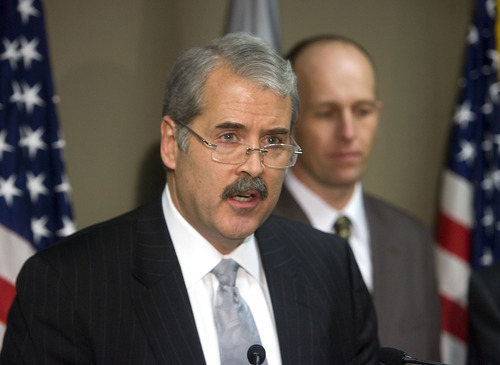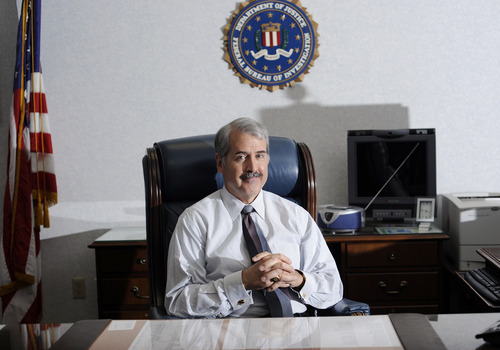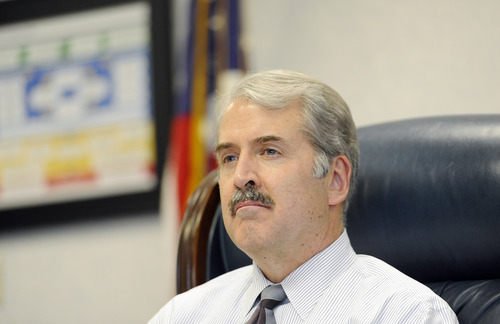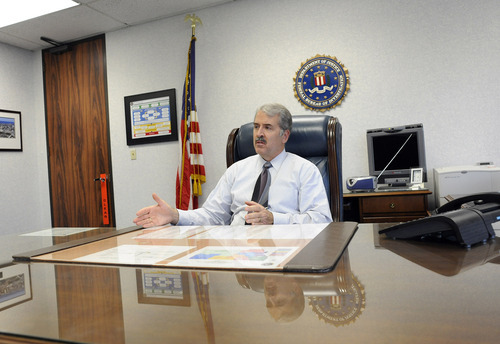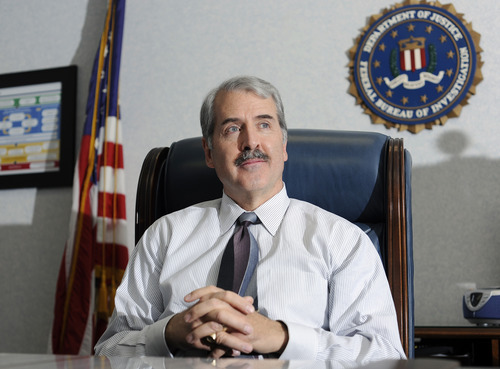This is an archived article that was published on sltrib.com in 2011, and information in the article may be outdated. It is provided only for personal research purposes and may not be reprinted.
The crime spree played out like a scene from a movie: Armed robbers in costumes. Heists that netted thousands of dollars, as tellers quivered on their knees and customers who got in the way of the masked intimidators were pistol-whipped. A community trembled, wondering what violent acts would come next.
The case kept James McTighe up at night.
An FBI special agent assigned to the bureau's Miami division, McTighe worked seven days a week for seven weeks straight until one day, in 1997, he got a break in the case that eventually led to the arrest of Rudolph Kidd and other bank robbers who had captured headlines in southern Florida.
Kidd, now 40, was ordered to serve 200 years in prison for the crime. McTighe, special agent in charge of the FBI's Salt Lake City field office, remembers Kidd's arrest as one of the pinnacles in a 30-year-career with the organization that ended Tuesday.
"Nobody seemed to be able to catch them," McTighe, 56, recalled at his downtown Salt Lake City office. "I remember feeling such a personal sense of responsibility that I had to do something or somebody was going to be killed. Ultimately, one of the guys in the bank robbery ring made a mistake and tried to rob a bank by himself. He ended up confessing ... and we ended up finding the ringleaders."
McTighe was appointed to the Salt Lake City office by FBI Director Robert Mueller in November 2009, following the departure of Timothy Fuhrman, who left the office to take a command in Mobile, Ala.
In his two years in Utah, McTighe worked to strengthen relationships between the FBI and local jurisdictions, particularly by bolstering membership to a task force aimed at combatting gangs across the Salt Lake Valley. The Valley Police Alliance Safe Streets Task Force, a collaboration of 36 local, state and federal officers, investigated about 350 gang cases from January to April, according to recently released statistics.
McTighe said collaboration among agencies is a philosophy that rapidly changed during his tenure in the FBI.
McTighe started with the FBI in 1983 when, after graduating from training at the FBI Academy in Quantico, Va., he worked in the bureau's Cincinnati division investigating property crimes, drugs and public corruption. He transferred to Miami in 1986 where, besides the Kidd robbery case, he worked on kidnapping, extortion and an array of other investigations.
He moved into administration in 1998, when he was promoted to a shift supervisor in the Strategic Information and Operations Center at FBI headquarters in Washington, D.C. It was there that he observed the terrorist attacks in New York and the Pentagon on 9/11 and watched the FBI increase its devotion to improving homeland security efforts and build partnerships with other law enforcement agencies.
"What I saw from the time I started in the bureau to now is almost a complete transformation in interacting with partners in our intelligence community. We do almost nothing alone. We almost always, in criminal and national security cases, work with other agencies. In my experience, that has made this organization stronger," McTighe said.
McTighe worked assignments in Denver and Cleveland before he applied to become special agent in charge in Salt Lake City — a move partly inspired by his love for Utah's mountains.
He flagged improving the Safe Streets Task Force as one of his first goals, a project that colleagues say is paying off with more gang arrests and weapons seizures. The FBI has had a Safe Streets Task Force for years, but local and federal agencies this fall joined the FBI's efforts to crack down on gangs in an expanded initiative. Several agencies, including Salt Lake City, left Salt Lake County's 21-year-old Metro Gang Unit in favor of the FBI task force.
Salt Lake City Police Chief Chris Burbank said he is happy with the direction the task force is taking, particularly at a time when gangs are growing more sophisticated in their criminal endeavors — and he credits McTighe with making the task force happen.
"Every time there is a change [with leadership in the Salt Lake City FBI field office], there's a little uncertainty of 'Who is the next person and how is it going to be?' Jim didn't miss a beat," Burbank said. "We're going to miss him tremendously. He's a personal friend as well as a partner professionally."
U.S. Attorney Carlie Christensen also complimented McTighe and his office for federal agents' participation in notable Utah cases over the past year and a half.
Christensen said the FBI was essential to building a federal case against Brian David Mitchell, who this month was sentenced to life in prison for the 2002 kidnapping and rape of then-14-year-old Elizabeth Smart. Mitchell's case had languished in state court for six years over issues of competency, but federal prosecutors were able to successfully litigate Mitchell's case in U.S. District Court.
Christensen said FBI agents were also instrumental in a racketeering case against members of the Tongan Crip Gang. Several high-ranking gang members were indicted in that case, dismantling the street gang in the process. The case is set to go to trial this fall.
Other cases in which the FBI was involved include that of Jeffrey Lane Mowen, a Lindon man who was ordered to serve 10 years in federal prison last month, after pleading guilty to one count of wire fraud in connection with a Ponzi scheme that took more than $18 million from more than 200 investors. FBI agents also worked with federal prosecutors on the cases of Cynthia Jones, Johnson Joe and Michael Whitehorse, who were ordered to prison for a December 2009 sexual assault on Navajo Nation land.
"He has been terrific to work with," Christensen said. "As you can probably appreciate, investigative agencies and prosecutors don't always see eye-to-eye on things. While we do not always agree, [McTighe] is very thoughtful; he is very responsive to concerns."
McTighe plans to return to Virginia following his retirement, where he'll be closer to five of his children. He said he has mixed feelings about turning in his badge and gun and leaving a lifelong passion that started when he was a child enamored with his father's career as a CIA agent.
"It's a special calling. It's not like any other job, despite the sacrifices," McTighe said. "When I walk out this door for the last time, I will be a former special agent. It will be a transition."
Twitter: @mrogers_trib Utah's FBI office one of many
The FBI has 56 field offices, including its Salt Lake City branch, located in major metropolitan areas across the U.S. and Puerto Rico. The offices serve as the regional headquarters for investigations and a place where agents assess regional crime threat. Each field office is overseen by a special agent in charge, who monitors progress of agents' cases and implementation of FBI initiatives.


